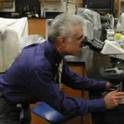Article
Inhibition of PKC attenuates Pseudomonas aeruginosa elastase-induced epithelial barrier disruption
American Journal of Respiratory Cell and Molecular Biology
(2011)
Abstract
Pseudomonas aeruginosa pulmonary infection compromises the human airway epithelium, and can be especially devastating to immunocompromised or debilitated individuals. We have reported earlier that P. aeruginosa elastase (PE) increases paracellular permeability in epithelial cell monolayers by mechanisms involving tight junction (TJ) disruption and cytoskeletal reorganization, leading to destruction of epithelial barrier function. The aim of this study was to investigate putative TJ targets and potential mechanisms by which PE induces barrier disruption. We found that PE decreased localization of TJ proteins, occludin and zonula occludens (ZO)-1, in membrane fractions, and induced reorganization of F-actin within 1 hour. Although inhibition of protein kinase (PK) C α/β signaling modestly altered the extent of cytoskeletal disruption and ZO-1 translocation, we found PKC signaling to play a significant role in decreased occludin functionality during PE exposure. Furthermore, elevated PKC levels correlated with decreased levels of TJ proteins in membrane fractions, and increased paracellular permeability in a time-dependent manner. Therefore, we conclude that PKC signaling is involved during PE-induced epithelial barrier disruption via TJ translocation and cytoskeletal reorganization. Specifically, occludin, as well as associated ZO-1 and F-actin, may be early targets of PE pathogenesis occurring via a PKC-dependent pathway.
Keywords
- epithelial permeability,
- tight junction,
- Pseudomonas aeruginosa,
- elastase,
- protein kinase C
Disciplines
Publication Date
2011
DOI
http://www.atsjournals.org/doi/abs/10.1165/rcmb.2010-0459OC
Citation Information
Curtis A. Clark, Lauren K. Thomas, and Ali O. Azghani. 2011. Inhibition of PKC attenuates Pseudomonas aeruginosa elastase-induced epithelial barrier disruption. Am. J. Respir. Cell Mol. 45: 1263-1271.
